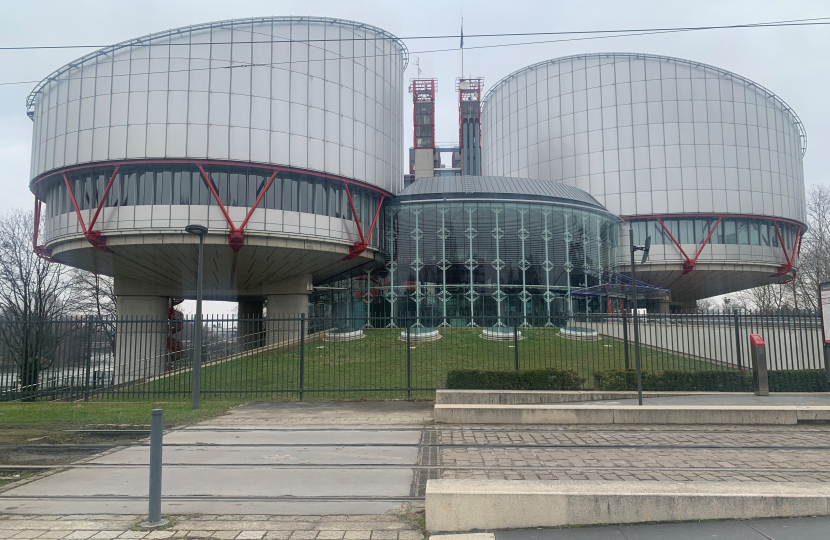
For Europe, Human Rights starts with the European Convention on Human Rights. It has never been more important. They are not obscure, academic rights. They are our rights, and we all rely on them. Who, for example, is aware that the European Court of Human Rights (ECtHR) has looked at freedom of trade unions and what the human rights are that are involved? Similarly, the Convention on Human Rights has never been more relevant or more protective in what it covers. There is a savage war of aggression at the heart of Europe between Russia and Ukraine. Human Rights are crucial here in trying to assess what Russia has done and to contain its future actions.
In almost every country, extremist groups are gaining strength and putting pressure on human rights. Just look at those countries who want to take away all that makes life bearable for the LGBT community allegedly in the name of increasing the rights of families. We must not forget too that Europe is not a ‘clean’ continent. Within living memory Greece was run by Colonels. Spain and Portugal only lost their fascist governments in 1975. It has never been more important to ensure that the Convention is applied fairly across Europe and that the judgements of the ECtHR are implemented.
Yet amidst all this there is a need to tell people what human rights are and how and why they are being protected. It is no use, for example, the ECtHR taking a detached attitude and expecting people to understand what it is and how it works. That leads to mistruths and misconceptions. For example, despite what the European press may think, the ECtHR is not part of the EU and never has been. It is disheartening that, for many in the UK, Europe has become synonymous solely with the EU. It is part of the Council of Europe, a completely different organisation with its own remit for looking after human rights, democracy and the rule of law in Europe.
Many make fun of the Council of Europe and call it nothing more than a talking shop. But in determining how human rights operate we have to remember that the Council of Europe is a multilateral organisation. As a staunch multilateralist, I firmly reject the notion that any country can tackle challenges single-handedly. Platforms for discussions and exchanges of ideas are essential. Despite the current global attack on multilateralism, I stand by the belief that dialogue and collaboration are indispensable. What this means is having somewhere where ideas can be talked through and discussion can take place, and that is what the Council of Europe does.
The link with democracy is also clear. As the Council of Europe itself has said, our democracies are not fixed, once and for all. They need a guiding light to show how they can be safeguarded and how their ideals and principles can be cherished and developed. This is exactly what the Council of Europe does and what human rights are all about. Just look at the work of the Parliamentary Assembly, the Committee of Ministers of the Council of Europe, the Court of human rights, the anti-corruption activities of the Group of States against Corruption, the anti-human trafficking work undertaken by the group of experts on action against trafficking in human beings, and the work of the Venice Commission and see how they all help strengthen democracy.
So, I would like to see a programme of European seminars, high profile and hard hitting, explaining to individuals in cities across the continent what human rights are, what the ECtHR does and how they can use it. Accompanying this would be an engagement programme with local press and media to make sure that the message gets home.
That means change – change in how the ECtHR operates. But change is what has already been initiated. When the UK was last President of the Council of Europe, it introduced the Brighton Declaration which amongst things introduces the concept of subsidiarity. That means accepting a clearer and more straight forward relationship between our own courts and the ECtHR with priority for local courts. These have to have exhausted all their avenues before the ECtHR comes into play. The Declaration has only recently come fully into force. What we therefore need is an ability to work with countries to make sure they have grasped what is involved and working with them too to develop the right court structure locally as well. But just as democracy is not a once and for all concept, human rights are not either. In a changing world, new opportunities arise for developing human rights. What about the development of AI (Artificial Intelligence) or climate change? And what effect do they have on human rights. Neither of these are easy concepts to work with. A recent Chatham House paper clearly sets out the human rights consequences of AI. It argues that human rights, as a crystalisation of ethical principles, should be the base-line. It goes on to point out that human rights laws offer a “well-calibrated method of balancing the rights of the individual against competing rights and interests using tests of necessity and proportionality.” The solution lies in including those with human rights expertise in the governance of AI.
I also recall the difficulties I had with environmental protection. I tried to introduce a report into the Parliamentary Assembly a report making ecoside a crime and preventing environmental damage being created in times of armed conflict. I got the report adopted unanimously. The assertions of individual countries though were problematic. It is essential that the Council of Europe works with countries from the beginning to make sure that any regulations which are adopted have broadest consent and application. It is also crucial that good guidance is produced to help their implementation.
There is a wide variety of human rights actors practicing in this area. Not all are of the same standard. We need to have a reliable data base to be able to tell the wheat from the chaff. This would be very welcome to all involved making life easier for those intent on accessing the ECtHR and for the ECtHR itself.
One group of individuals it is essential to work with are Ombudspersons. As a mediator, I have chaired meetings with the UN and other bodies to determine what makes a good ombudsperson and to try to link it in with the views and principles of the Council of Europe.
These and similar projects are essential if we wish the structure of human rights to last for another 75 years. We need the Council of Europe to step up to the plate to see us through. We need good quality information and guidance to continue the protection of human rights across the continent.

